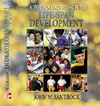 |  Life-Span Development: A Topical Approach John W. Santrock
The Life-Span Perspective Introduction
Web LinksHistory of Childhood
(http://www.socsci.kun.nl/ped/whp/histeduc/links09b.html)
A wonderful web site for exploring the history of childhood. Includes children in antiquity, children in the middle ages, children in colonial times, texts on the social histories of childhood, children in the Victorian period, and information about many web resources on related topics. |
 |  |  | Children's Issues
(http://www.childrennow.org/links.html)
A great Internet source for information about a wide range of children's issues. Includes extensive links to education, safety, the media, health, parenting, children around the world, and many other topics. |
 |  |  | Children's Rights
(http://www.crin.org)
This global network provides extensive information about children's rights and whether their needs are being met in many countries around the world. Includes links to the Convention on the Rights of the Child, child rights publications, and links to related topics. |
 |  |  | UNICEF
(http://www.unicef.org/fhpright.htm)
Very up-to-date information about children's rights around the world. Provides information about UNICEF's State of the World's Children reports and many other aspects of children's well-being and rights. |
 |  |  | Exploring Aging Issues
(http://www.aoa.dhhs.gov)
The U.S. Administration on Aging web site with access to information about many aging issues, such as elder abuse, health care, and the adequacy of caregiving. Also includes statistics regarding a number of different areas of older people's lives. |
 |  |  | National Aging Information Center
(http://www.aoa.dhhs.gov/naic/)
Searchable databases about many aspects of aging are provided, along with information about publications on aging that can be obtained. |
 |  |  | Global Resources on Aging
(http://www.aoa.gov/international/oiar.html)
Extensive connections to web sites with information about aging in more than 15 countries around the world. You also can connect with web sites on aging at many colleges and universities in the United States. This is an excellent resource on aging. |
 |  |  | Adult Development and Aging
(http://aging.ufl.edu/apadiv20/apadiv20.htm)
The web site of Division 20, Adult Development and aging, of the American Psychological Association. Includes resources for students, information about publications on adult development and aging, links to organizations involving adult development and aging, and more. |
 |  |  | The Gerontology Society of America
(http://www.geron.org)
Find out about this very large, prestigious organization that cuts across a number of disciplines-psychology, medicine, sociology, and others. Read about the Society's journals, the various sections of the Society, and the Society's annual convention. |
 |  |  | Geropsychology Resources
(http://www.premier.net/~gero/geropsyc.html)
Extensive connections to web sites on such topics as medical aspects of aging, Alzheimer's disease, Parkinson's disease, and clinical psychology. You also can connect through this web site to leading university gerontology centers. |
 |  |  | Freud's Theory
(http://www.nypsa.org/)
The web site of the Abraham A. Brill Library of the New York Psychoanalytic Association with extensive information about Freud's theory and links to personality research programs with a psychoanalytic orientation. |
 |  |  | Erikson's Theory
(http://snycorva.cortland.edu/~ANDERSMD/ERIK/welcome.html)
Provides a summary chart of Erikson's eight stages, a biography of Erikson, critiques and controversies related to Erikson's theory, and links to other sites with information about Erikson's views. |
 |  |  | Horney's Theory
(http://www.ship.edu/~cgboeree/horney.html)
Read more in depth about Karen Horney's psychoanalytic theory that addresses women's issues. |
 |  |  | Piaget's Theory
(http://www.piaget.org/)
The web site of the Jean Piaget Society with information about Piaget's theory and links to other sites with information about Piaget's theory. |
 |  |  | Vygotsky's Theory
(Http://leda.calstatela.edu/faculty/psparks/theorists/501vygot.htm)
Describes the basic views of Vygotsky: includes biographical information and implications of Vygotsky's view for education. |
 |  |  | Behavioral and Social Cognitive Theories
(http://chiron.valdosta.edu/whuitt/col/soccog/soclrn.html)
Focuses on Bandura 's social learning views, especially observational learning. Includes a link to information about behaviorism. |
 |  |  | Albert Bandura
(http://www.ship.edu/%7Ecgboeree/bandura.html)
Provides a biography of Bandura and information about his views on observational learning, television and violence, and personality development. |
 |  |  | Exploring Ethology
(http://cogweb.english.ucsb.edu/EP/Ethology.html)
Explore ethological curiosities, including storage of visual information in ants, calculation by spiders, and imitation by birds. |
 |  |  | Brofenbrenner'sTheory
(http://www.human.cornell.edu/faculty/facultybio.cfm?netid=ub11&facs=1)
Brofenbrenner's personal web site with his comments about his current interests. |
 |  |  | Brofenbrenner and a Multicultural Framework
(http://www.treatment.org/taps/tap20/tap20debord.html)
Explores Brofenbrenner's ecological, contextual theory in terms of community diversity issues and a multicultural framework. |
 |  |  | Correlational Research
(http://trochim.human.cornell.edu/tutorial/lamar/ylamar.htm)
Extensive information about correlational research. You can study correlation and causality, uses of the correlational method, how to plan various correlational studies, common mistakes in correlational studies, and understanding correlational statistics. |
 |  |  | Experimental Research
(http://trochim.human.cornell.edu/kb/desexper.htm)
Helps you learn about how the experimental method works. |
 |  |  | Ethics
(http://www.apa.org/ethics/code.html)
The web site of the American Psychological Association on ethical principles with information about such topics as respecting others, nondiscrimination, sexual harassment, evaluation, assessment, intervention, teaching, training, supervision, and research. |
|



 2002 McGraw-Hill Higher Education
2002 McGraw-Hill Higher Education